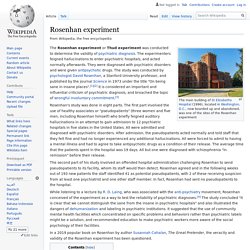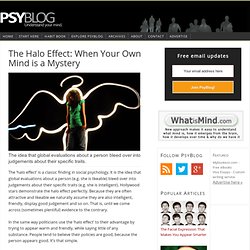

Discovering Psychology - 02 - Understanding Research. Watch Free Documentaries Online. In the early 1970s, Craig Haney, Curt Banks, Carlo Prescott, and Philip Zimbardo conducted a landmark situational study at Stanford University.

The experiment tested the fundamental attribution error: our tendency to attribute causes of behavior to personal factors, underestimating the influence of situational conditions. For this study, a small group of college students volunteered to be subjects and were carefully tested for sound psychological and physical health. Half of the students were randomly selected to act as prisoners, the other half to act as guards. The study took place in a simulated jail facility in the Stanford University Psychology Department. Ten Psychology Studies from 2009 Worth Knowing About - David DiSalvo - Brainspin.
Image by AFP/Getty Images via Daylife Several great psychology and neuroscience studies were published in 2009. Below I’ve chosen 10 that I think are among the most noteworthy, not just because they’re interesting, but useful as well. 1. If you have to choose between buying something or spending the money on a memorable experience, go with the experience. According to a study conducted at San Francisco State University, the things you own can’t make you as happy as the things you do. 2.
Psychology studies relevant to everyday life from PsyBlog. 10 Brilliant Social Psychology Studies. Ten of the most influential social psychology experiments.

“I have been primarily interested in how and why ordinary people do unusual things, things that seem alien to their natures.Why do good people sometimes act evil? Rosenhan experiment. Experiment to determine the validity of psychiatric diagnosis Rosenhan's study was done in eight parts.

The first part involved the use of healthy associates or "pseudopatients" (three women and five men, including Rosenhan himself) who briefly feigned auditory hallucinations in an attempt to gain admission to 12 psychiatric hospitals in five states in the United States. All were admitted and diagnosed with psychiatric disorders. After admission, the pseudopatients acted normally and told staff that they felt fine and had no longer experienced any additional hallucinations. All were forced to admit to having a mental illness and had to agree to take antipsychotic drugs as a condition of their release. The second part of his study involved an offended hospital administration challenging Rosenhan to send pseudopatients to its facility, whom its staff would then detect.
While listening to a lecture by R. Pseudopatient experiment[edit] Non-existent impostor experiment[edit] Halo Effect. The idea that global evaluations about a person bleed over into judgements about their specific traits.

The ‘halo effect’ is a classic finding in social psychology. It is the idea that global evaluations about a person (e.g. she is likeable) bleed over into judgements about their specific traits (e.g. she is intelligent). Hollywood stars demonstrate the halo effect perfectly. Because they are often attractive and likeable we naturally assume they are also intelligent, friendly, display good judgement and so on. That is, until we come across (sometimes plentiful) evidence to the contrary.
In the same way politicians use the ‘halo effect’ to their advantage by trying to appear warm and friendly, while saying little of any substance. How the Brain Stops Time. One of the strangest side-effects of intense fear is time dilation, the apparent slowing-down of time. It's a common trope in movies and TV shows, like the memorable scene from The Matrix in which time slows down so dramatically that bullets fired at the hero seem to move at a walking pace.
In real life, our perceptions aren't keyed up quite that dramatically, but survivors of life-and-death situations often report that things seem to take longer to happen, objects fall more slowly, and they're capable of complex thoughts in what would normally be the blink of an eye. Now a research team from Israel reports that not only does time slow down, but that it slows down more for some than for others. Top 10 Most Famous Thought Experiments. Thought experiments are mental concepts or hypotheses, often resembling riddles, which are used by philosophers and scientists as simple ways of illuminating what are usually very dense ideas.

Most often, they’re used in more abstract fields like philosophy and theoretical physics, where physical experiments aren’t possible. They serve as some hearty food for thought, but given their complex subject matter, it’s not unusual for even the thought experiment itself to be nearly incomprehensible. With this in mind, here are ten of the most famous thought experiments, along with explanations of the philosophical, scientific, and ethical ideas they work to explain: 10. The Trolley Problem. The Top 10 Psychology Studies of 2010. The end of 2010 fast approaches, and I'm thrilled to have been asked by the editors of Psychology Today to write about the Top 10 psychology studies of the year.
I've focused on studies that I personally feel stand out, not only as examples of great science, but even more importantly, as examples of how the science of psychology can improve our lives. Each study has a clear "take home" message, offering the reader an insight or a simple strategy they can use to reach their goals , strengthen their relationships, make better decisions, or become happier.